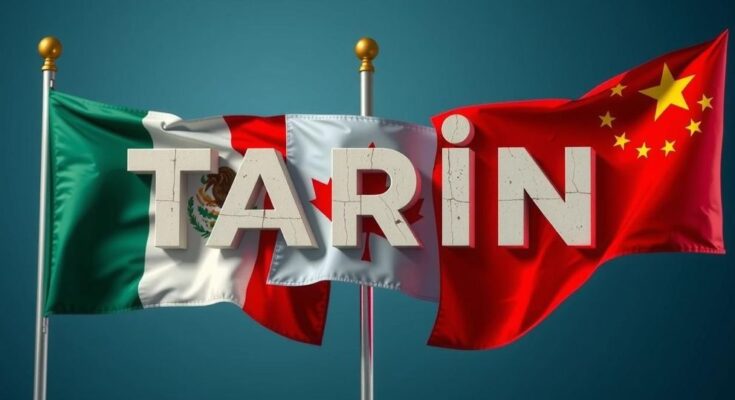President-elect Donald Trump plans to implement substantial tariff increases on imports from Mexico, Canada, and China as a response to illegal immigration and drug trafficking. He pledges a 25% tariff on all goods from Mexico and Canada and an additional 10% on Chinese goods, hoping to leverage these measures to deter illegal activities while boosting domestic manufacturing. Economists caution that tariffs could inflate consumer prices and lead to retaliatory trade actions.
On Monday, President-elect Donald Trump declared his intention to impose significant tariff increases on goods imported from Mexico, Canada, and China, effective immediately upon taking office. He stated that these tariffs would serve as a response to illegal immigration and the influx of drugs into the United States. Trump committed to a 25% tariff on all products from Mexico and Canada, linking the imposition of these tariffs to a decrease in drug trafficking and illegal immigration. Additionally, he revealed plans to raise tariffs on Chinese goods by 10% amid ongoing concerns over the flow of illegal drugs, particularly fentanyl, into the U.S. market.
Throughout his campaign, Trump positioned tariffs as an instrument to boost domestic manufacturing and provide needed tax revenues. However, economists warn that these tariffs could lead to inflation, ultimately impacting American consumers. Scott Bessent, Trump’s Treasury secretary nominee, indicated that inflation from tariffs could be mitigated if properly executed. It is worth noting that while Trump has faced resistance to such measures in the past, he intends to significantly escalate tariff rates during his second term, raising concerns about the potential onset of trade wars and their consequences for the global economy.
The announcement from President-elect Trump marks a continuation of his administration’s prior strategy of utilizing tariffs as a means to negotiate trade relations and address issues like illegal immigration and drug trafficking. Historically, Trump’s tariff policies resulted in reciprocal actions from affected countries, leading to trade wars that complicated the intended benefits of increased domestic manufacturing. Economists have generally voiced concerns about the long-term implications of tariffs on inflation and consumer pricing, suggesting that these measures do not always yield the desired effect on domestic production.
In summary, Trump’s proposed tariff increases reflect a strong stance against illegal immigration and drug trafficking, signaling a significant economic policy shift. While he aims to leverage tariffs to protect American interests and enhance manufacturing, the potential repercussions on inflation and international relations cannot be overlooked. As Trump prepares to implement these policies, it remains crucial to evaluate their broader implications on the U.S. economy and global trade partnerships.
Original Source: www.cnn.com




